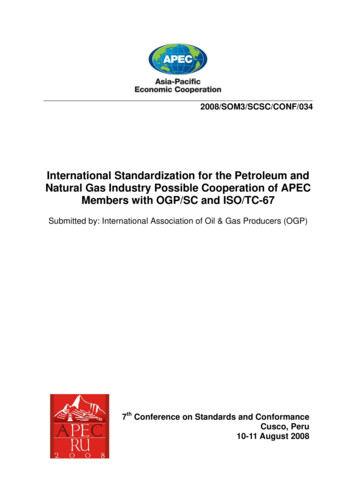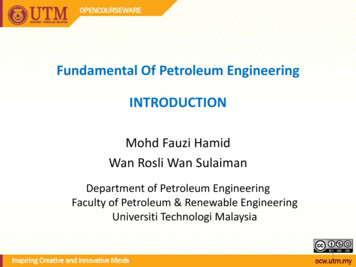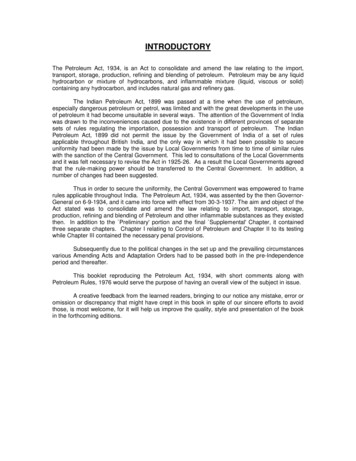
Transcription
2008/SOM3/SCSC/CONF/034International Standardization for the Petroleum andNatural Gas Industry Possible Cooperation of APECMembers with OGP/SC and ISO/TC-67Submitted by: International Association of Oil & Gas Producers (OGP)7th Conference on Standards and ConformanceCusco, Peru10-11 August 2008
APEC/SCSC7th CONFERENCE ON STANDARDS ANDCONFORMANCEPeru - Cusco, 10 to 11 August 2008International Standardization for the Petroleum and Natural GasIndustryPossible Cooperation of APEC Members with OGP/SC and ISO/TC-67ENG. WILSON BARBOSA de OLIVEIRAPetrobras - BrazilCorporate Technical Standardization ManagerOGP Standards CommitteeVice-ChairmanISO/TC-67Brazil RepresentativeWHAT IS OGP? Formed in 1974 to develop effective communication betweenthe upstream industry and international regulators Members– National & regional associations– Publicly traded, private & state oil & gas companies– Major service companies Members produce more than half of the world’s oil and aboutone third of its gas Offices in London and Brussels
Standards WorkshopsOGP VISIONTo work on behalf of all the world’s upstream companies topromote responsible and profitable operationsOGP MISSION To represent the interests of the upstream industry tointernational regulatory and legislative bodies To achieve continuous improvement in safety, health andenvironmental performance and in the engineering andoperation of upstream ventures To promote awareness of Corporate Social Responsibilitywithin the industry and among stakeholders
OGP eLegalCommitteeCommitteeforMeteorology StructuresCommitteeGLOBAL EXPERIENCE OGP has access to a wealth of technical knowledgeand experience with its members operating around theworld in many different terrains. OGP collate and distil this valuable knowledge into arange of reports and guidelines. Some for general usewhile others are restricted to OGP members.
OGP STANDARDS COMMITTEE MEMBERSHIPOGPSCmeetstwicea year.Met30 Jul2008MEMBERS 1)COMPANY COUNTRYWilson Barbosa de OliveiraAnatoly BaryshnikovGail BaxterFelicia DecusaraAlf Reidar JohansenJoachim G. KoenigTom KelleherAlain LoppinetMartin MaesoDavid MillerSaif S Al Naimi 3)Abdullah Humaid 4)Manuel Paga CastellanosTerry Qin 2)Neil daCENEnergy InstituteAPIQatar PetroleumSaudi AramcoRepsolYPFCPSCShellDaniel RiocheTotalTrevor VyzeRoss SmithMike SwidzinskiRichard TorgersenMirmohamad rSaudi ArabiaSpainChinaNetherlandsOTHER FUNCTIONSOGP/SC Vice-ChairCEN/TC12 AH8 ChairOGP/SC ManagerCEN/TC12 ChairAPI Std. Progr. Dir.IFAN President, OGP/SC Chair,ISO/TC67 Interin ChairFranceSwitzerlandUSAUKUSAIranTechnical Group Mgr.Notes: 1) Plus corresponding members from: BG, Chevron, Mærsk and Premier. Alternates:2) Du Delin & Xiaohong Chen, CPSC 3) Muayad Ajjawi, 4) Fathi AbughabanOIL & GAS STANDARDS HISTORY Historically, the American organisations API, ANSI, ASME, ASTM& AWS etc. developed the standards frequently used by theupstream world wide oil & gas industry. North Sea operating companies developed lots of in-house andproject specifications to fit their needs not covered by theAmerican standards. Growing EU interest for developing European upstream standardsemerged in view of EU’s “new approach” for technical standardsto support the general safety requirements in the EU directives.– A change in developing oil & gas standards &specifications was required
ISO INITIATIVE & OGP SUPPORT OGP supported the ISO initiative in 1987 to reactivate ISO /TC67 (created in 1947) to develop ISO standards for theupstream – the petroleum & natural gas industry This created a global arena for standards development, whereall ISO members and nations concerned have a role to play ANSI, USA were offered and accepted responsibility for theISO / TC67 secretariat First meeting of the revived ISO/TC 67 in Paris 1989 A new era in the global upstream industry standardisation hadstarted
ISO TC67 has published 130 standards.API has adopted 50 of these as joint API / ISO standards.CEN has adopted 100 of these as joint European EN ISO standards.China, India, Kazakhstan have also adopted many of these ISO standards.OGP POSITION on STANDARDSThe OGP has been a catalyst for change in the industry’s approach to standardsand strongly supports the internationalisation of key standards used by thePetroleum and Natural Gas Industries. OGP ’s position on standards is:–––––––development and use of ISO and IEC standards should be promoteddevelopment of standards should be based on a consensus of need“users” should be represented on standards work groupsduplication of effort should be avoidedstandards should be simple and fit for purposeInternational standards should be used without modification wherever possiblecompany specifications should be minimised and written, where possible, asfunctional requirements.The adoption of this approach is expected to minimise barriers to trade,enable more efficient worldwide operations, and improve the technicalintegrity of equipment, materials, and offshore structures used by thePetroleum and Natural Gas Industries. OGP Report 381, April 2007
OGP STANDARDS COMMITTEEBUSINESS PLAN 2008 Support development of ISO/IEC standardsProgress development of OGP member identified standardsSupport work of Instrument & Materials groupsProduce 2008 Standards BulletinHold technical workshopsBetter understanding of Regulators use of standardsIdentify and address barriers to adoption of standardsBenchmark OGP members work with the production and use ofstandards.OGP/SC BUSINESS PLAN 2008cont. Key publications:– Contribute to publication of 19 targeted ISO/TC67 standards– Report on regulatory use of international standards– 2008 Standards Bulletin 2008 Workshops:– Provisionally planned for Western Europe & Beijing– Potential workshop on to discuss harmonisation and development ofcoating standards Proposed budget:– Roll Technical editing JIP into OGP mainstream– 35.000 for consultancy services
ISO STANDARDS FOR THE OIL AND GAS INDUSTRYHOW IT WORKS!ISO ORGANIZATION Consensus-basedMarket drivenTechnically currentInternationally expertiseVoluntary, not mandatedMeet requirements of WTO Technical Barriers toTrade
ISO ORGANIZATIONcont. “One country, one vote” Equal footing for all countries Right to join any technical committee or policycommittee of commercial/technical interest Voting rights on all standards Access to global community of technical expertsISO, IEC and ITU ORGANIZATION
ISO FOR OIL AND GAS INDUSTRYISO technical committees cover many‘energy’ and related sectors including: TC 27 – Coal TC 28 – Petroleum Products TC 67 – Materials, Equipment & Offshore Structures for thePPNGI TC 85 – Nuclear Energy TC 180 – Solar Energy TC 193 – Natural Gas TC 197 – Hydrogen Energy TC 203 – Technical Energy Systems (Basic Concepts)ISO/TC-67 – MATERIALS, EQUIPMENTS andOFFSHORE STRUCTURES for PETROLEUM,PETROCHEMICAL and NATURAL GASINDUSTRIES Secretariat – API on behalf of ANSI Created – 1947, and reactivated 1987 Scope: Standardization of the materials, equipment andoffshore structures used in drilling, production, transport bypipelines and processing of liquid and gaseoushydrocarbons within the petroleum, petrochemical andnatural gas industries. Excluded: aspects of offshore structures subject to IMOregulations (TC8 – “Ships and Marine Technology”) Participating countries – 28 Observing countries – 28 Standards published - 135
ISO/TC-67 MISSIONTo create value-added standards for the oil and natural gasIndustries VISIONGlobal standards used locally worldwideVISION OF GLOBAL STANDARDS
ISO/TC-67 PARTICIPANTS OperatorsService/supply companiesManufacturersGovernment regulatorsConsultantsAcademicsExperts are nominated by their national standards body toparticipate in work effortISO/TC-67 MEMBERS Participating Members 28Argentina, Brazil, Canada, China, Denmark, Finland, France,Germany, Indonesia, Italy, Japan, Kazakhstan, Korea(Republic of), Mexico, Netherlands, Nigeria, Norway, Oman,Portugal, Qatar, Romania, Russian Federation, South Africa,Spain, Ukraine, United Kingdom, United States, Venezuela Observing Members 28Australia, Austria, Azerbaijan, Belgium, Bulgaria, Colombia,Croatia, Cuba, Czech Republic, Ecuador, Egypt, Hong Kong,Hungary, Iran (Islamic Republic), Ireland, Malaysia, Moldova(Republic of), Mongolia, Poland, Saudi Arabia, Serbia,Singapore, Slovakia, Sweden, Switzerland, Thailand, Trinidadand Tobago, Viet Nam
ISO/TC-67 MEMBERSHIPISO/TC-67 COUNTRY MEMBERSParticipating MembersObserving MembersISO/TC-67 SC and WG ORGANIZATIONWG 8Materials
ISO/TC-67MANAGEMENT COMMITTEE Representative from each “P” countryCoordinates TC67 activities with ISO CSSeeks resources for SC – technical experts, funds, etc.Publishes the Business Plan (requirement of ISOTechnical Management Board) Maintains N435-Policies and Procedures, N654Management System, and N731-Management Plan Accepts TC publication targets, and works towardguiding documents through DIS and FDISISO/TC-67MANAGEMENT COMMITTEE Brazil, Canada, China, France, Germany, Italy, Japan,Netherlands, Norway, Qatar, United Kingdom, UnitedStates Liaisons – OGP, IADC and CEN/TC12
COST SAVINGS OFTOP 30 ISO STANDARDSHOW TO CO-OPERATE and PARTICIPATE OGP: Open to national and regional associations, publiclytraded, private and state oil & gas companies, majorservice/supply companies OGP/SC: Open to the OGP member companies OGP/SC Meetings: Twice a year (usually) in any countryinvolved or other by invitation ISO/TC-67: Open to operators, service/supply companies,manufacturers, government regulators, consultants, academics ISO/TC-67 Plenary: Annually in any ISO/TC-67 rotates among “P”member countries2008 – China, Beijing2009 – Canada, Calgary or Ottawa (tentative) ISO/TC-67 SC and WG: Any date, any ISO/TC-67 rotates amongmember countries – usually in SC or WG member countries Workshops, Seminars and Conferences:– Usually during the ISO/TC-67 and/or OGP/SC meetings– In conjunction with relevant events – local, national, regional,international– By invitation– Other suggested arrangements
KEY NOTESJoin the OGP, ISO and IEC globalefforts in International Standardsdevelopment&Capture the value added by makinguse of the new ISO/IEC Standards forthe oil & gas industryGlobalStandardsUsed LocallyWorldwide
THANK YOUQUESTIONS?CONTACTSNeil Reeve – OGP/SC Chair and ISO/TC-67 Interin ChairE-mail neil.reeve@shell.com Wilson Brabosa de Oliveira – OGP/SC Vice-ChairTel. 55-21-3229-0445E-mail wbarbosa@petrobras.com.br Alf Reidar Johansen – OGP/SC ManagerE-mail Alf.Reidar.Johansen@ogp.org.uk gwww.tc67.netwww.ogp.org.uk
COST SAVINGS OF TOP 30 ISO STANDARDS HOW TO CO-OPERATE and PARTICIPATE OGP: Open to national and regional associations, publicly traded, private and state oil & gas companies, major service/supply companies OGP/SC: Open to the OGP member companies OGP/SC Meetings: Twice a year (usually) in any country involved or other by invitation











